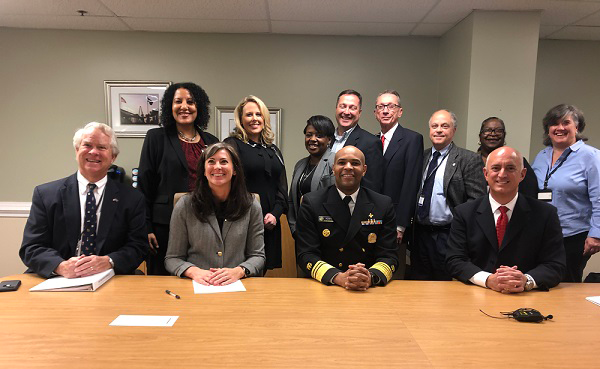To ensure you’re receiving the most up-to-date and accurate information, please choose the correct agency from the homepage. The DHEC website is no longer being updated and will be permanently unavailable Dec. 31, 2024.
U.S. Surgeon General, S.C. DHEC and S.C. DAODAS Meet in Charleston to Discuss HIV Epidemic, Opioid Crisis
FOR IMMEDIATE RELEASE:
Dec. 19, 2019
COLUMBIA, S.C. - The S.C. Department of Health and Environmental Control (DHEC) and S.C. Department of Alcohol and Other Drug Abuse Services (DAODAS) welcomed United States Surgeon General Vice Admiral Jerome M. Adams and other public health leaders today to address statewide community health issues, with a focus on HIV and opioid use.
During the Surgeon General’s visit to DHEC’s Lowcountry Public Health Clinic in Charleston, DHEC Director Rick Toomey and Lowcountry Public Health Director R. Taylor Lee joined several public health partners in discussing South Carolina’s ongoing efforts to combat the HIV epidemic as part of the “Ending the HIV Epidemic: A Plan for America” initiative. South Carolina was selected earlier this year to be part of this new strategy to end the national HIV epidemic by 2030.
“The fight against HIV is an issue that, like so many other public health issues, must be addressed through partnerships at the local, state, and national levels,” said DHEC Director Rick Toomey. “Having the support of the Surgeon General, state public health experts, and local leaders positions our state to make great strides in our shared goal of ending the HIV epidemic.”
“I believe we have the right data, the right tools, and the right leadership to accomplish this historic goal of ending the HIV epidemic in America,” said Dr. Adams. “We are at a pivotal point in our collective efforts to end the spread of HIV in America and we must use a whole-of-society approach in our response. I was glad to learn more about the efforts taking place in Charleston and across the Palmetto State, and look forward to continuing to work together in achieving our shared goal of ending the HIV epidemic.”
Click here to download photos from the event.
Recent reporting indicates nearly 20,000 South Carolina residents are living with HIV (including AIDS), ranking the state 11th nationally, with an AIDS case rate of 15.8 per 100,000 population. Of those newly diagnosed, 66 percent were African American, 22 percent were white, and 8 percent were Hispanic.
As part of South Carolina’s commitment to ending the HIV epidemic, the cities of Charleston and Columbia, DHEC, and local partners signed the Paris Declaration on Fast-Track Cities in early 2019. The declaration calls on cities to strengthen their identified treatment targets for reducing new HIV-related infections and ending AIDS-related deaths.
“We’re proud to be a Fast Track City to address this public health issue and eliminate the stigma associated with HIV,” said Charleston Mayor John J. Tecklenburg. “By building strong partnerships, we can increase public awareness of treatment opportunities and prevention resources.”
In addition to discussing HIV, the Surgeon General’s visit was an opportunity for DHEC, DAODAS, and other partners to provide an update on South Carolina’s efforts to address opioid abuse. As part of this update, VADM Adams received a tour of Charleston Center, the county’s public provider of substance use disorder services, and discussed local efforts with DAODAS Director Sara Goldsby, Charleston Center Director Chanda Funcell, Ph.D., and Charleston County Sheriff J. Al Cannon, Jr.
“It is an honor to have the Nation's Doctor visiting our state to see from the front line the good work we are doing and the challenges we still face,” said Director Goldsby. “Achieving our collective goals relies on the links and support between local, state and federal efforts.”
“Combating the opioid crisis is a top priority for me, and for all of my colleagues at the Department of Health and Human Services. Prevention and treatment are critical and I was glad to learn more about the vital work being done in those key areas, right here in Charleston to help end the epidemic,” said Dr. Adams.
In 2018, there were 816 deaths from opioid overdoses reported in South Carolina. DHEC and DAODAS created the Law Enforcement Officer Naloxone (LEON) program in 2015. The program trains law enforcement officers across South Carolina to identify and treat opioid overdoses by administering life-saving naloxone. To date, 214 law enforcement officer agencies have joined the program, over 10,000 officers have been trained and over 1,000 lives have been saved. Due to the success of the LEON program, DHEC collaborated with the State Fire Academy to expand the naloxone training to fire departments.
Additionally, DHEC has several programs that play an integral part in combating opioid overdoses and deaths across the state. As part of this effort DHEC and DAODAS are active members of the Governor’s Opioid Emergency Response Team and continue to work with partners to highlight a multitude of prevention and awareness activities.
For information about HIV testing and local HIV testing sites, call 1-855-4SCDHEC (1-855-472-3432), or visit DHEC's service locator at scdhec.gov/HIVLocator. Additional information about statewide opioid use is available at justplainkillers.com/data.
